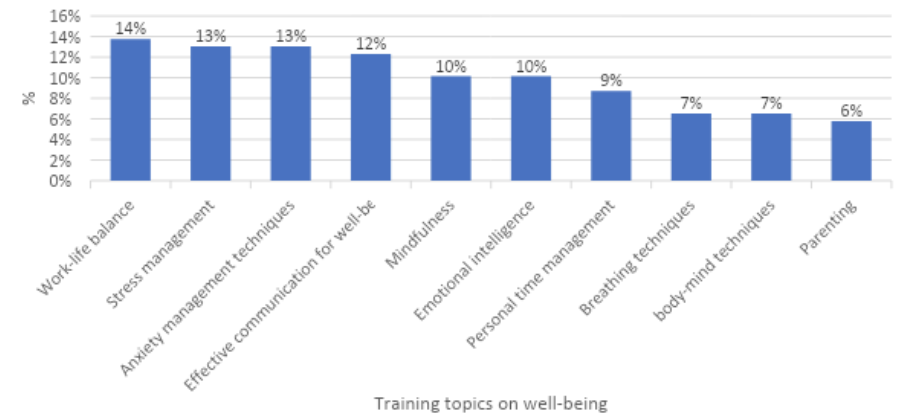The subject of well-being in the workplace is more current than ever. The new normal as a result of the COVID-19 pandemic, especially concerning the way that it has affected working conditions (e.g., remote work), highlights the importance of placing a special focus on the psychosocial well-being of employees at work policies and initiatives.
A survey on well-being at work was disseminated among HR professionals in Cyprus, by the Institute of Development and GrantXpert consulting, in the framework of the THRIVE@WORK project. The aim of the survey was to examine the perceptions and viewpoints of HR professionals concerning the importance of protecting well-being at work, the challenges they face during their efforts, the identification of best practices and their intentions in developing well-being programmes. A total of 37 HR professionals took part in the study. The key results of the survey are presented below.
Overall Organisational Well-being and Perceived factors influencing well-being at work
HR professionals were asked to rate on a scale from 1 (strongly disagree) to 5 (strongly agree) the extent to which items (e.g. “My organisation takes employees’ well-being seriously”) reflect their organisations’ overall approach to well-being. Findings indicated that overall, organisations in Cyprus hold a positive approach towards well-being (M = 3.95, SD = 0.93) in taking positive action on health and well-being, taking employees well-being seriously, and committing resources to promote employees well-being, and understanding the importance of employee well-being. HR professionals were also asked to rate on a scale from 1 (strongly disagree) to 5 (strongly agree) perceived factors that influence well-being at work (e.g. “Leadership commits resources and effort to promote well-being in this organisation”). Participants scored moderately to high on the Health and Safety practices (M = 3.71) and the Relationships (M = 3.64) factors, suggesting that overall organisations perceive these factors as important in promoting workplace well-being.
Obstacles for the implementation of well-being programmes
Participants were also asked about factors that hinder their efforts in implementing well-being programmes. Findings suggested that lack of leadership commitment and lack of resources were the most frequently reported hindering factors (Figure 1).

Training on Well-being
The majority of respondents expressed an interest in receiving training in well-being issues in organizations. Respondents mentioned a number of specific trainings to promote wellbeing at work that they would be interested in attending. The most frequently mentioned trainings were stress management, work-life balance, and anxiety management techniques (Figure 2).

Policy recommendations
In light of these findings relevant workplace wellbeing policy recommendations that will be relevant to policy-makers and decision-makers at the government level (e.g. National HR Associations), but could also be used by HR professionals/managers who wish to apply such policies in their organisations, are presented below:
Policy recommendation 1: Support the “front line”
One of the main challenges organisations face in implementing workplace wellbeing practices involves the lack of line managers commitment, capability, knowledge and skills in supporting employees’ wellbeing. It is with no doubt that managers have a vital role to play in influencing employees’ experience at work and feelings associated with these experiences. It is also within their control to create a positive supportive environment to enable people to thrive and feel that they can be understood and receive the support and guidance they need when they are feeling unwell or struggling with their wellbeing. Yet too many organisations are not providing the support and training needed to ensure managers have the confidence and capability to do this job significantly. As such, support and guidance need to be provided to ensure managers have the right skills to support staff, but that they are also looking after their own wellbeing (Positive Leadership). For example, each organisation could consider having a ‘wellbeing first aid manager’ who would undergo specific training on how to provide comfort to colleagues who may be experiencing poor mental health (e.g. stress) and guide/encourage them to receive help from a mental health professional.
Policy recommendation 2: Encourage empathetic management and Positive leadership
Organisations that wish to thrive by safeguarding their employees’ psychosocial wellbeing need to hire and/or develop more effective managers and leaders. This requires looking beyond traditional strategies for management development and cultivating the skills most important for success. One of those skills is empathy (as well as compassion) – a skill that has been considered as a vital leadership competency. Empathetic leadership means having the ability to understand the needs of others and being aware of their feelings and thoughts. Demonstrating empathy in the workplace can improve social interactions in general, and lead to more effective communication and a positive organisational culture. This in turn will lead to more positive outcomes on an individual and workplace level.
Policy recommendation 3: Access to Employee Assistant programmes and counselling services
Employees often struggle with deeper issues or might be going through a crisis. Although managers or co-workers might have the intentions to support them, they might simply not know how. Therefore, managers can refer employees to counselling services when they feel that they cannot help them with a deeper mental health issue. Providing employees with free access to counselling services can give them the chance to speak up and be honest about their well-being in a safe environment and receive the help they need. It goes without saying that one does not need to be in a crisis to go to therapy. Knowing that counselling services is a free option provides employees with security. That knowledge in itself – knowing that it is possible to talk issues out with a specialist – can help reduce employee stress.
Policy recommendation 4: Recognise that workplace stress is a health and safety issue
A number of factors can lead to workplace stress including unrealistic expectations, tight deadlines, heavy workloads. Stress can have a toll on employees’ physical and mental well-being, and if left untreated it can lead to burnout. This highlights the need for a proactive approach and preventive interventions where organisations identify workplace stress factors, evaluate employees’ well-being and carry out risk assessments of the business. This approach allows organisations to take steps prior to the occurrence of anticipated stressful situations. Such a policy could also incorporate training in good management practices (e.g., set realistic targets and deadlines for staff to prevent long working hours) for all management levels. Through this training managers could receive resources, knowledge and skills on how to identify stress factors and how to effectively deal with them.
Policy recommendation 5: Creating a supportive and positive workplace environment
A supportive work environment is crucial to creating a productive organization and increasing employee well-being. Thus, organisations need to be encouraged to offer employees flexible benefits that they really need (e.g., flexible working hours), as such benefits demonstrate the organization’s concern for employees. Moreover, organisations can take steps in increasing the presence of enriching job characteristics, which signal to employees that the organization cares about their well-being. These include meaningful work tasks, the opportunity to work autonomously and occasions to participate in organizational decision-making. Leaders and all staff need to be informed about the factors and skills that contribute to workplace wellbeing, such as strengths-based feedback, recognition of achievements and effort, sense of meaning and purpose at work, positive relationships etc. Finally, organisations can create a supportive workplace environment and positive organisational culture by showing recognition but also appreciation to its employees, as this can increase their motivation, commitment and loyalty to the organisation, but most importantly it can increase one’s well-being. It is important to note here that in order to create a supportive and positive work environment, it is essential to provide training on workplace wellbeing to all staff members (e.g. based on Positive Psychology’s PERMA model) as having a positive work environment is not only the responsibility of the manager but of all employees.
Conclusion
Findings indicate that there are some efforts and commitment, both on the policy level but mainly individually within the companies, to promote well-being at work. Nevertheless, more could be done and far more to be accomplished by implementing workplace well-being programmes and help HR professionals overcome the obstacle they face in implementing such programmes, especially today when more and more companies are focusing on their employees’ well-being.
The THRIVE@Work project aims to promote well-being at work by encouraging Human Resources professionals to dedicate resources and invest in programmes for the psychosocial well-being of their staff.
In the framework of the THRIVE@Work project the following free resources will be developed:
- EU Handbook for the development of well-being programmes
- THRIVE@WORK Training and Mentoring Programme
- THRIVE@WORK Online Training Platform
All project products and actions will be especially designed to promote continuous training of HR Managers/Officers on well-being programmes to ultimately sustain and enhance employees’ psychosocial wellbeing, reduce work-related stress, and ultimately improve staff productivity, efficiency and engagement.
Website: https://thriveatworkproject.eu/

